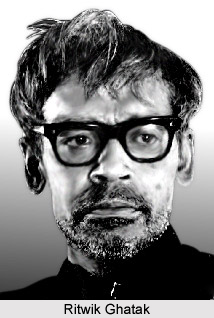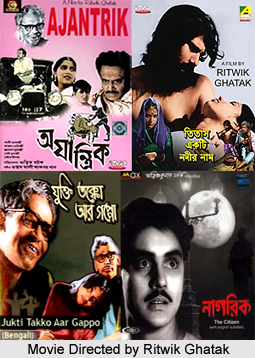 Ritwik Ghatak is a popular name among Indian movie directors who made a mark in the world cinema. He mainly directed Bengali Cinema and is a source of inspiration of many Bengali Film Directors. He wrote the script of all his films as well and through his films he poured out his heart making statements through his films. This rarely talented director was born on 4 November 1925 in Dhaka in East Bengal. Then he moved to Kolkata. He wrote his first play Kalo Sayar in the year 1948. In 1951, Ghatak joined the Indian People`s Theatre Association where he wrote, directed and acted in plays. In 1957, he wrote and gave direction to his last play Jwala.
Ritwik Ghatak is a popular name among Indian movie directors who made a mark in the world cinema. He mainly directed Bengali Cinema and is a source of inspiration of many Bengali Film Directors. He wrote the script of all his films as well and through his films he poured out his heart making statements through his films. This rarely talented director was born on 4 November 1925 in Dhaka in East Bengal. Then he moved to Kolkata. He wrote his first play Kalo Sayar in the year 1948. In 1951, Ghatak joined the Indian People`s Theatre Association where he wrote, directed and acted in plays. In 1957, he wrote and gave direction to his last play Jwala.
Ritwik Ghatak is the name, the symbol for meaningful cinema that catered to a thousand of audience around the globe, first the bong clan then the global clan. Ritwik Ghatak especially nurtured the meaningful cinema, the New wave cinema that sprouted its wing throughout in full bloom amidst the Indian cinematic field. In that contemporary genre, the field of art was unarguably confined to the palatable plates of painting and literary and non fictional writing in India, till the time frame when people introduced themselves to the silver screen, in 1913.
As the screen remained mute for sometime, so was the audience towards this form of art. With the passage of time, as the sound was introduced in the screen, the movie makes realized the influential prowess of the screen. It was however not late that the medium was accepted as a popular platform to realize one`s potentials and voice the societal concerns.
Early Life of Ritwik Ghatak
He was born in East Bengal, Dhaka and later moved to Kolkata, West Bengal with his family during the great famine that struck Bengal in 1943. His severe experience with the refugee camps and extreme hardships while living in torrid conditions made him into a hard thinker and inspired him to make some of the best cinematic works well.
The 1971 Bangladesh Liberation War, which led to more refugees fleeing to India, was to also have a similar impact on his work. Ghatak was influenced by the arguments that Sergie Eisenstein, the Russian filmmaker and Rabindranath Tagore, a poet and a Bengali writer put across. He was not influenced by Hollywood or the French New Wave Cinema but like Jean-Luc Godard, who was obsessed by the Vietnam War, Ghatak was obsessed with the Bengal Partition.
Personal Life of Ritwik Ghatak
Ritwik Ghatak`s father`s name is Suresh Chandra Ghatak who was a district magistrate, a poet and a playwright; His mother was Indubala Devi. His elder brother Manish Ghatak was a professor of English and a social activist. He was a radical writer of his time too.
 Career of Ritwik Ghatak
Career of Ritwik Ghatak
He entered in the arena of film with Nemai Ghosh`s Chinnamul (1950) where he acted and directed as assistant as well. His first complete film was Nagarik (1952). It was the first authentic realistic film and a direct call to political action. It featured great actor from the stage, Kali Banerjee. In 1958 he made Ajantrik which shows the daring originality and the innovative talent of Ghatak. His next venture was Bari Theke Paliye (1959). It was centred on a child who runs away to Kolkata and encounters both human warmth and cruel rules of the society. Ritwik Ghatak thrived to be an exponent of Melodrama like Kenji Mizoguchi of Japan and Rainer Fassbinder of West Germany. The works have a climate which is not exactly soap opera dramatics but a particular form of heightened expression in which film elements are pitched at a higher level than the realist norm. The result is a disruption of passive assimilation of screen drama and a motivation to critically engage with what is depicted. Ghatak is now considered by many critics as the pre-eminent Indian filmmaker.
The following year Ghatak directed a masterpiece in Bengali and Indian cinema and one of his most powerful and innovative works, Meghe Dhaka Tara. The Cloud-Capped Star (1960), now canonised as one of the greatest Indian films ever made, centres on a young unmarried woman Neeta (Supriya Choudhury) who is forced to bear the economic burden of her whole family. Harsh, intense and gut-wrenching, Ghatak`s vividly-realised, strikingly-shot and uniquely-scored film is both a paean to women`s boundless courage and strength and an indictment of an opportunistic and oppressive social structure. The film starred Anil Biswas and Supriya Devi. What followed this flick were Mi Bemol (1961) and Subarnarekha (1965). The latter was the magnum opus of Ghatak and included some of the finest Bengali performers: Madhabi Mukherjee, Abhi Bhattacharya, Bijon Bhattacharya and Jahor Roy. Impact and Influence of Ritwik Ghatak on Indian Cinema was huge.
His next complete film came in 1971 and was known as Titash Ek Nadir Naam. In 1974 he directed Jukti, Takko aar Gappo. He was himself part of the crew alongside the great actor Bijon Bhattacharya and Utpal Dutta.
Ritwik Ghatak acted in films such as Tothapi (1950), Chinnamul (1951), Kumari Mon (1962), Subarnarekha (1962), Titas Ekti Nadir Nam (1973) and Jukti, Takko, aar Gappo (1974).
His short films and documentaries include The Life of the Adivasis (1955), Places of Historic Interest in Bihar (1955), Scissors (1962), Fear (1965), Rendezvous (1965), Civil Defence (1965), Scientists of Tomorrow (1967), Yeh Kyon (1970), Amar Lenin (1970), Puruliar Chhau (1970) and Durbar Gati Padma (1971).
Works of Ritwik Ghatak
Films
As Director and Screenplay Writer
Nagarik (The Citizen) (1952)
Ajantrik (The Unmechanical, The Pathetic Fallacy) (1958)
Bari Theke Paliye (The Runaway) (1958)
Meghe Dhaka Tara (The Cloud-Capped Star) (1960)
Kamol Gandhar (E-Flat) (1961)
Subarnarekha (1962/1965)
Titash Ekti Nadir Naam (A River Called Titash) (1973)
Jukti Takko Aar Gappo (Reason, Debate and a Story) (1974)
As Screenplay Writer
Musafir (1957)
Madhumati (1958)
Swaralipi (1960)
Kumari Mon (1962)
Deeper Nam Tiya Rong (1963)
Rajkanya (1965)
As Actor
Tothapi (1950)
Chinnamul (1951)
Kumari Mon (1962)
Subarnarekha (1962)
Titas Ekti Nadir Nam (1973)
Jukti, Takko, aar Gappo (1974)
Short films and Documentaries By Ritwik Ghatak
The Life of the Adivasis (1955)
Places of Historic Interest in Bihar (1955)
Scissors (1962)
Fear (1965)
Rendezvous (1965)
Civil Defence (1965)
Scientists of Tomorrow (1967)
Yeh Kyon (Why/The Question) (1970)
Amar Lenin (My Lenin) (1970)
Puruliar Chhau (The Chhau Dance of Purulia) (1970)
Durbar Gati Padma (The Turbulent Padma) (1971)
Incomplete films and documentaries by Ritwik Ghatak
Bedeni (1951)
Kato Ajanare (1959)
Bagolar Bangodarshan (1964-65)
Ronger Golam (1968)
Ramkinkar (1975)
Screenplays That Didn`t Workout
Okal Basonto (1957)
Amritokumbher Sandhane (1957)
Arjan Sardar (1958)
Bolidan (1963)
Aronyak (1963)
Shyam Se Neha Lagei (1964)
Sansar Simante (1968)
Padda Nadir Majhi
Notun Fasol
Raja
Sei Bishnupriya
Princess Kalaboti
Lojja
Theatre Life of Ritwik Ghatak
Chandragupto (Dwijendralal Ray), actor
Achalayoton (Tagore) (1943), director and actor
Kalo Sayor (Ghatak) (1947-48), actor and director
Kalonko (Bhattacharya) (1951), actor
Dolil (Ghatak) (1952), actor and director
Kato Dhane Kato Chaal (Ghatak)(1952)
Officer (Gogol) (1953), actor,
Ispaat (Ghatak) (1954-55), un-staged
Khorir Gondi (Bertolt Brecht|Brecht)
Galileo Chorit (Brecht)
Jagoran (Atindra Mozumdar), actor
Jalonto (Ghatak)
Jala (Ghatak)
Dakghar (Tagore)
Dheu (Biru Mukhopadhay)
Dhenki Swarge geleo Dhan bhane (Ghatak/Panu Paul)
Natir Puja (Tagore)
Nabanna (Bhattacharya)
Nildarpan (Dinabandhu Mitra), actor
Nicher Mahal (Gorky), un-staged
Netajike nie (Ghatak)
Poritran (Tagore)
Falguni (Tagore)
Bidyasagar (Banaphool)
Bisarjan (Tagore)
Vangabandor (Panu Paul), actor
Voter vet (Panu Paul), actor
Musanfiro ke lie (Gorky), actor
Macbeth (Shakespeare), actor
Raja (Tagore)
Sanko (Ghatak), actor
Sei Meye (Ghatak), director
Strir Patro (Tagore)
Hojoborala (Sukumar Ray)
Contribution of Ritwik Ghatak
Thematic crux of Ghatak`s films marked the part of a generation that witnessed both the partition of Bengal during Indian independence in 1947 and the independence of Bangladesh from Pakistan in 1971. The painful disasters and horrified scenes of these bloody passages of history haunt Ghatak`s cinema, which documents the wailing Bengali conscience. The cinematic venture affiliated with the theatre arm of the Communist Party of India and though his conscience was over powered with the climate of human consideration and humanity, leftist ideas pervade his films.
The style of Ghatak left an indelible mark on world cinema. Extremely keen he was about the inherent qualities of the. His work portrays the dizzying use of deep-focus cinematography, his complex, layered and often disorienting soundtrack, frequent employment of close-ups, terseness of cinematic expression and the use of major narrative ellipses. Ghatak was admittedly influenced by the writings of Bertolt Brecht and his films imbibe from Brecht`s method. Brecht was preoccupied with the use of theatrical devise and the linking up of the audience with stage.
Death of Ritwik Ghatak
This great director died on 6th February in the year 1976.Ritwik Ghatak was a multifaceted character; an Indian-Bangladeshi filmmaker, scenarist, film theorist, critic, author, actor and theatre director who made eight feature-length films in total ranging from the year 1950s and the 1970s. Given his maverick rejection of prevailing cinematic conventions, Ghatak, unlike his contemporary, Satyajit Ray (of whose "disinfected realism" he was a vocal critic), was not widely celebrated during his lifetime. A host of later-day filmmakers, most notably his students Mani Kaul and Kumar Shahani generally cite him as their chief influence.






